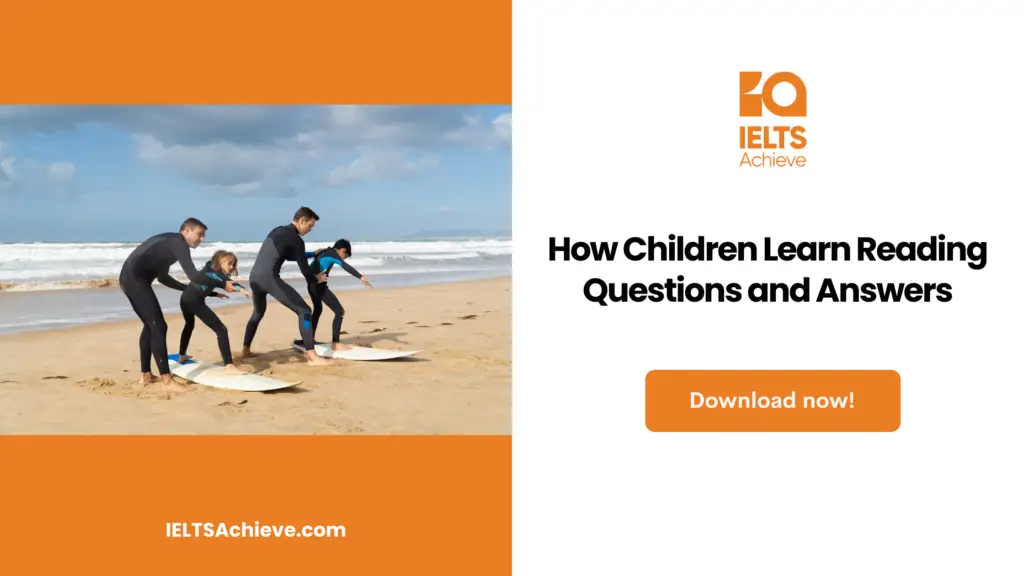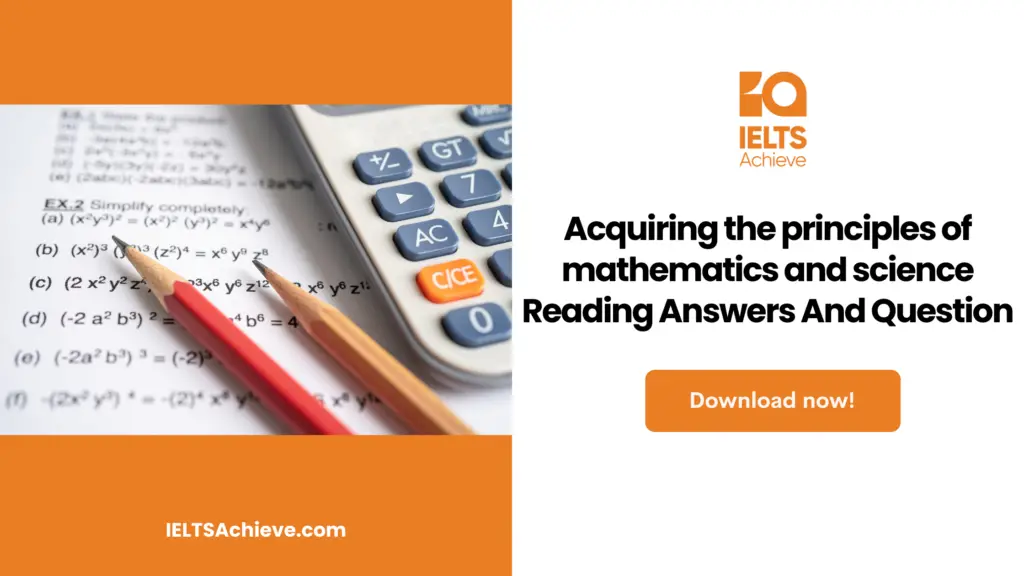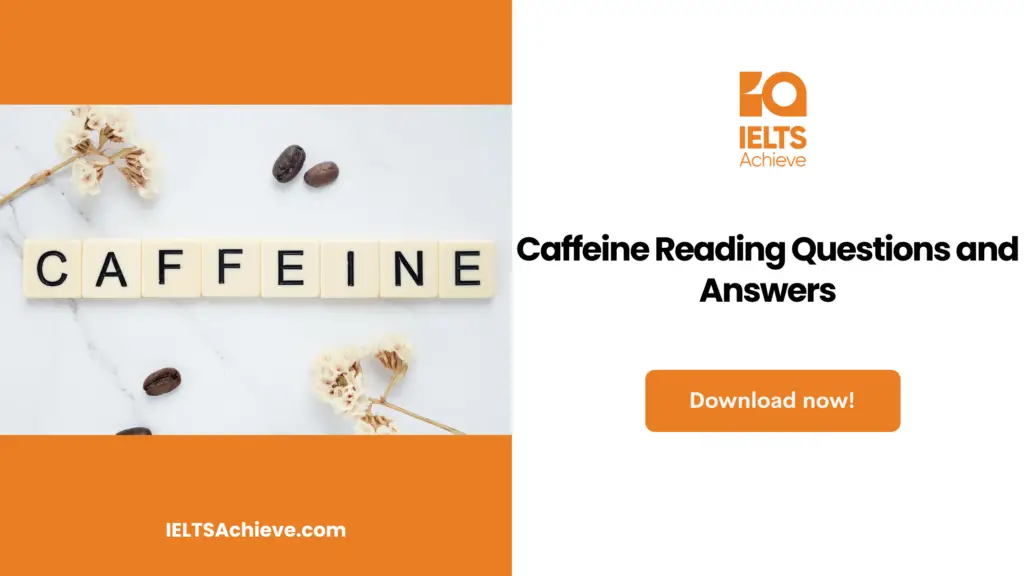The Blog post contains the following IELTS Reading Questions:
- IELTS Reading Sentence Completion
- IELTS Reading True/False/Not Given
- IELTS Reading Short Answer Questions
Stay informed and prepared for success – Explore our comprehensive Reading Test Info page to get valuable insights, exam format details, and expert tips for mastering the IELTS Reading section.
IELTS Reading Passage – How Children Learn

How Children Learn
The way in which children learn is an ever-growing area of study. It is obvious that children differ from adult learners in many ways, but what is interesting is that there are also quite a number of surprising commonalities across all learners of all ages. A study of young children fulfils two purposes: it helps to highlight the strengths and weaknesses of the learners who populate a nation’s schools, and it offers a window into the development of learning that cannot be seen if one considers only well-established learning patterns and expertise. When an observer studies the development of children over time, a dynamic picture of learning unfolds. An understanding of infant thinking mental processes or cognition and how young children from 2 to 5 years old add information to their knowledge ‘data base’ helps child psychologists to better equip students for their transition into formal school settings.
For much of the 20th century, most psychologists accepted the traditional thesis that a newborn’s mind is a tabula rasa or blank slate upon which the record of experience is gradually impressed. It was further thought that verbal communication was a prerequisite for abstract thought and so, in its absence, a baby could not have comprehension. Since babies are born with a limited range of behaviours and spend most of their early months asleep, they certainly appear passive and unknowing. Therefore, it was commonly thought that infants lack the ability to form complex ideas. Until recently, there was no obvious way for them to demonstrate anything to the contrary to researchers.
In time however, challenges to this view arose. It became clear that with carefully designed scientific procedures, psychologists could find ways to pose rather complex questions about how much infants and young children know and what they are capable of doing. Psychologists began to employ new methodologies and began to gather a substantial amount of data about the remarkable abilities that young children possess. Their research stood in great contrast to the older emphases which focussed almost entirely on what children lacked. The mind of young children came to life through this research, it became clear that very young children are both competent and active when it comes to their conceptual development.
A major move away from the earlier tabula rasa view of the infant mind was taken by the Swiss psychologist Jean Piaget. Beginning in the 1920s, Piaget argued that the young human mind could best be described in terms of complex cognitive or ‘thinking’ structures. From close observations of infants and careful questioning of children, he concluded that the development of the mind proceeds through certain stages, each involving radically different thinking processes. Piaget observed that infants actually seek stimulation from their surroundings thus promoting their intellectual development. He showed that their initial representations of such things as space and time as well as awareness of objects and self are constructed only gradually during the first 2 years. He concluded that understanding in young infants is built up through the gradual coordination of sight, sound and touch.
After Piaget, perceptual learning theorists studied how newborns begin to integrate sight and sound and explore their surroundings. They saw that learning in infants proceeded rapidly when they were given the opportunity to explore the objects and events they encountered. Theories were developed which attempted to describe how the brain processes information. It was around this time that the metaphor of the mind as computer came into wide usage.
In order to study what babies know and can learn about readily, researchers needed to develop techniques of ‘asking’ infants what they know. Because infants are so limited physically and verbally, experimenters interested in finding out how babies think had to find methods suitable to an infant’s motor capabilities. New ways were developed for measuring what infants prefer to look at and detecting changes in events to which they are sensitive. Three such methods that were used were sucking, habituation, and visual expectation.
Although theories put forward during this time differed in many ways, they shared an emphasis on considering children as active learners, those who actually assemble and organise information. Therefore, primarily cognitive development involves the acquisition of organised knowledge such as, an early understanding of basic physics, some biological concepts and early number sense. In addition, cognitive development involves gradually learning strategies for solving problems, understanding and remembering.
The active role of learners was also emphasized by Vygotsky, who focused on the role of social support in learning. According to Vygotsky, all cognitive skills and patterns of thinking are not primarily determined by the skills people are born with; they are the products of the activities practiced in the social environment in which the individual grows up. From Vygotsky’s research into the role of the social environment in the development of thinking came what he called a zone of proximal development. This zone which refers to tasks learners can do with the assistance of others, had a big impact upon developmental psychology. This line of work has drawn attention to the roles of parents, and teachers in challenging and extending children’s efforts to understand. It has also contributed to an understanding of the relationship between formal and informal teaching as well as learning situations and cognition.
Unlock your full potential in the IELTS Reading section – Visit our IELTS Reading Practice Question Answer page now!
Recommended Questions:
Renewable Energy IELTS Reading Question with Answer
Questions 27-30
Answer the questions below using NO MORE THAN FIVE WORDS for each answer.
27 What did early research into child capabilities focus on?
28 Who thought infants needed to communicate verbally in order to show advanced comprehension?
29 In what period of their growth do infants develop an awareness of time?
30 What TWO things is the infant mind compared to?
Questions 31-35
Do the following statements agree with the information given in Reading Passage 3?In boxes 31-35 on your answer sheet write
TRUE if the statement agrees with the information
FALSE if the statement contradicts the information
NOT GIVEN if there is no information on this
31 In many ways, children learn the same way adults learn.
32 20th century psychologists thought infants were unintelligent because they were usually asleep.
33 The focus of early research methods in child development have been similar to those conducted more recently.
34 Piaget showed that each new stage of learning builds upon the previous one.
35 Vygotsky’s research has had a positive impact upon many primary school teachers.
Enhance your skills in identifying information as True, False, or Not Given. Click here to discover expert strategies and techniques for mastering this question type in the IELTS Reading section.
Questions 36-40
Complete the sentences below with words taken from Reading Passage 3. Use NO MORE THAN TWO WORDS.
36 When it comes to learning new concepts, recent research has shown that children are both competent and ……………….37 Not only are young children capable of assembling information they are also able to……………… 38 ONE of the ways scientists measured infant preference was through …………………..39 An indicator of cognitive development is that knowledge must be………………. 40 Vygotsky believed that the key to learning lay in the individual’s …………………..
Enhance your sentence completion skills in the IELTS Reading section. Click here to access our comprehensive guide and learn effective strategies for filling in missing words or phrases in sentences.
Unlock your full potential in the IELTS Reading section – Visit our IELTS Reading Practice Question Answer page now!
Recommended Questions:
Renewable Energy IELTS Reading Question with Answer

We hope you found this post useful in helping you to study for the IELTS Test. If you have any questions please let us know in the comments below or on the Facebook page.
The best way to keep up to date with posts like this is to like us on Facebook, then follow us on Instagram and Pinterest. If you need help preparing for the IELTS Test, join the IELTS Achieve Academy and see how we can assist you to achieve your desired band score. We offer an essay correction service, mock exams and online courses.

